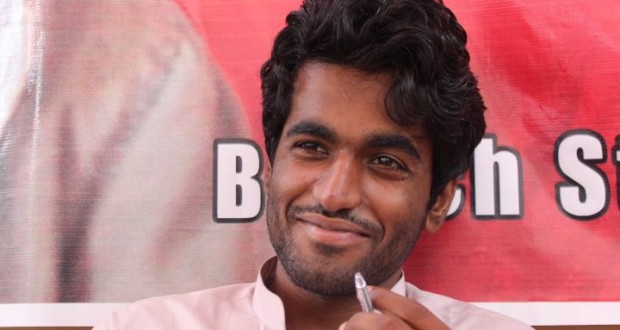NDTV Report
Karachi: Eyes yellowing but sparkling with determination, Lateef Johar vows to carry on his month-long hunger strike until his missing leader is recovered — or he dies and another young Baluch takes his place.
A month ago the 23-year-old chose to sit outside Karachi Press Club and refuse food, to demand the return of Zahid Baluch, the chairman of the Azad group of the Baluch Students Organisation (BSO).
The missing man was allegedly picked up by security forces on March 18 in Quetta, the capital of Baluchistan, Pakistan’s southwestern province which is racked by a separatist insurgency.
For a month Johar and other BSO activists searched for their chairman, but in vain.
With the hunt attracting little attention, the central committee of the BSO decided to launch a hunger strike “unto death” and Johar offered himself as the maiden volunteer.
“We just want that at least the world must know what is going on with us and how the state is suppressing our movement by kidnapping and killing our fellows,” Johar said.
The BSO is one of the largest Baluch student movements and favours independence for the vast, mineral-rich province.
Some accuse it of links to violent separatist groups who have waged a 10-year insurgency, with regular bomb and gun attacks on security forces and other symbols of the Pakistani state.
– ‘He cannot last a month’ –
Johar has lost 21 kilograms (46 pounds) of his body weight since beginning his protest and his frailty is obvious as he becomes breathless while talking.
Doctors say he is heading towards death.
“I am quite worried about his survival as he is so stubborn that he refuses to take even any medication,” Birma Jesrani, a doctor who regularly examines Johar, told AFP.
“I am afraid he could encounter a sudden medical condition any time and I don’t think he could last another month.”
Johar endures heat, humidity and the constant prick of mosquito bites in a tent in the teeming port city, a small book on Latin American revolutionary Che Guevara and a red-covered laptop by his side.
“I feel vertigo when I go to the toilet and walk even just a few steps. I just try to take 12 to 15 glasses of water daily,” Johar told AFP.
“I cannot sleep and keep changing the side and posture till morning. I start reading books or messaging on social media but the headache doesn’t let me do this for long,” he said.
Despite the hardship, he says he is determined to carry on.
“We are fully committed to sit on hunger strike and if I die someone else will replace me,” Johar said.
“We believe in peaceful struggle and we cannot pick up the gun, so this is our way to tell the world about our struggle.”
– ‘We are undeterred’ –
In recent years many people suspected of links to Baluch separatist groups have mysteriously disappeared, allegedly at the hands of Pakistan’s powerful intelligence agencies, and never been seen again.
Sometimes they reappear after months or years in detention. Or dead, their bodies left by a road or in a riverbed, a strategy dubbed “kill and dump.”
Baluch campaigners say the missing number in the thousands but the authorities dispute this, putting the figure at less than 100.
They also say that militant Baluch separatist groups are responsible for many of the disappearances.
“We are undeterred and we shall continue our struggle even if ‘something happens’ with our chairman,” Johar said, hinting at his worst fears about the missing student leader.
– Unheard struggle –
Karima Baluch, the young Baluch woman who has taken over as chair of BSO and sits vigil with Johar at his protest camp, points the finger at the government’s paramilitary Frontier Corps.
“We have ourselves witnessed how the men in FC uniform and in plain clothes took Zahid with them in our own presence,” Karima, her face veiled in traditional Baluch style, told AFP.
Manzoor Ahmed, a spokesman for the FC in Quetta, vigorously denied the claim.
“This is a baseless allegation — we are not involved in kidnapping of anybody,” Ahmed told AFP.
“These are allegations that we have illegally detained people, our commandant has strictly forbidden us to take part in any illegal act.”
Fighting between the army and Taliban militants in the country’s northwest attracts attention virtually every day in the Pakistani media.
But the struggle in remote Baluchistan, which has pitched separatists against state forces for a decade, is more overlooked. (Courtesy : http://www.ndtv.com/)
Republished in the Balochistan Point on May 24, 2014
 Balochistan Point Voice of Nation
Balochistan Point Voice of Nation




